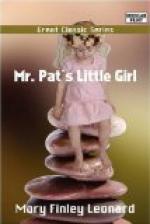For two hours before the sale began, a stream of people passed through the house, examining its contents, or wandered about the grounds, admiring the view and the fine beech trees. Friendship itself was well represented in the throng, but rather in the character of interested onlookers than probable purchasers.
Miss Betty was there to watch the fate of her silver, and Allan Whittredge had brought Rosalind, who was eager to see for herself what an auction was like. She hung entranced over Patricia’s miniature, which with some other small things of value had been placed in a glass case in the library, until her uncle told her if she would select some article of furniture that particularly pleased her, he would try to get it for her. This delighted her beyond measure, and after much consideration she chose a chest of drawers, with a small mirror above it, swung between two sportive and graceful dolphins. “The little dolphin bureau,” she called it.
[Illustration: “SHE CHOSE A CHEST OF DRAWERS.”]
The sale was to begin at eleven o’clock, and silverware and china were first to be disposed of. The long drawing-room was full of camp chairs, and the audience had begun to assemble when Rosalind entered and sat down in a corner to wait for her uncle, who was interviewing the auctioneer. Two rows in front of her she saw Miss Betty, with Mrs. Parton and Mrs. Molesworth.
“Do you expect to bid on your cream-jug and sugar-bowl when they are put up, Betty?” asked Mrs. Parton; adding, “How this chair squeaks! I wonder if it will hold me.”
“I haven’t made up my mind,” was the answer. “It goes against the grain to give money for what is really mine already. I can’t get over the impression that this is a funeral instead of a sale.”
“I wonder if the Whittredges will buy anything. I saw Allan in the hall,” said Mrs. Molesworth. She was a tall, angular person, with a severe manner, a marked contrast to Mrs. Parton, with her ample proportions and laughing face. “By the way, Betty,” she continued, “what has become of the ring?”
“I know no more than you.”
The entrance of several strangers and some confusion about seats, kept Rosalind from hearing any more of the conversation for a time. A portly man completely blocked the way, and she began to wonder if her uncle would be able to get to the chair she was keeping for him.
When things were quiet again, she heard Mrs. Molesworth say, leaning over Miss Betty and speaking to Mrs. Parton, “Why, she was an actress, wasn’t she?”
“I don’t see that that was such an insuperable objection,” Mrs. Parton replied, “In point of family she was just as good as he, perhaps a little better. The colonel and I met a lady at Cape May who knew them well. This girl was left an orphan early, and through the rascality of her guardian found herself penniless at seventeen. She had inherited the artistic gift of her family, only in her it took the dramatic turn, and necessity and her surroundings all combined to lead her in that direction. Then just as she was making a success she gave it up to marry—” Another interruption, and Rosalind did not hear whom she married.




